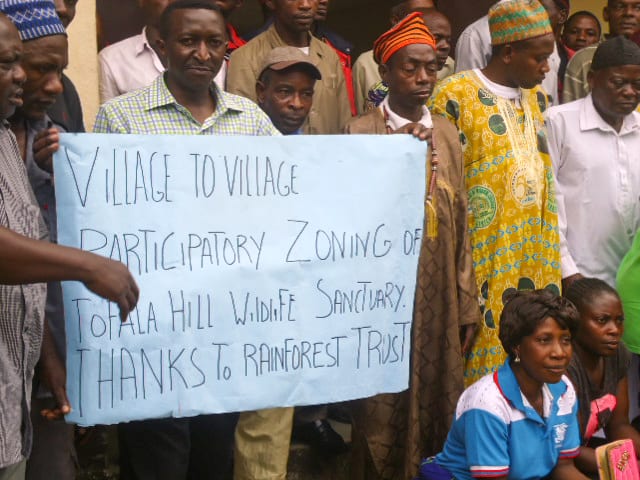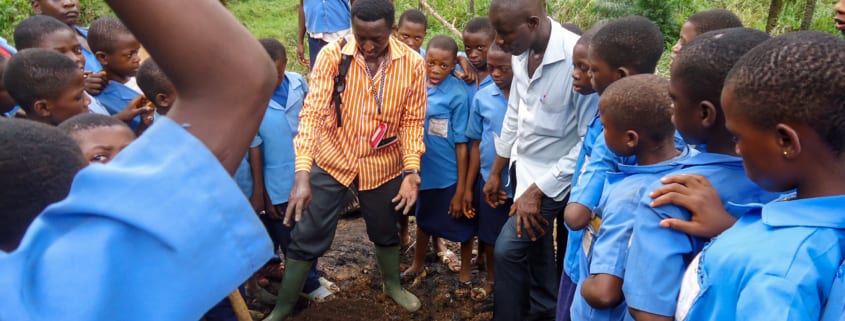Voices from the Rainforest: Samuel Ngueping, Rainforest Trust Conservation Fellow
Rainforest Trust projects thrive thanks to the important conservation work of people on the ground. Our Voices from the Rainforest series brings you news from our projects in Latin America, Africa, Asia and the Pacific — from the perspectives of those working in and for the rainforests.

Using Social Media as a Conservation Tool
Samuel Ngueping is a Protected Area Manager with Rainforest Trust Partner Environment and Rural Development Foundation (ERuDeF) in Cameroon. He began working at the ERuDeF Institute in 2013 as Program Development Officer and since, has worked there for many years in several different capacities. Since April 2018, he has been stationed at the ERuDeF head office in Buea, Southwest Region, working as the Director of Biodiversity and Protected Areas Management in the Conservation department.

Samuel (holding sign) participating in a sensitization meeting in Bechati. Photo by ERuDeF.
Why did you become a conservationist?
Since childhood, I have had a passion for nature. While attending primary and secondary school in the Western Region of Cameroon, I found through my studies that in the 1940s there were many local, threatened wildlife species, including African Forest Elephants, Lions and Leopards. I discovered that the Santchou Game Reserve was an important elephant hotspot in the region around that time. But unfortunately, I have realized that there are no more elephants in the reserve and no more large mammal species in the entire Western Region of Cameroon.
Because of my dream to see the charismatic African Forest Elephant, I decided to become a conservationist. This motivation prompted me to register in an undergraduate program in Botany at the University of Buea where there are many elephant ranges. I also earned my Master’s Degree in Protected Area Management. All these trainings have enabled me to acquire practical skills in the field of conservation in order to better contribute to the sustainable management of biodiversity as a whole.
What inspires you most or makes you proud about being a Fellow?
Being a Rainforest Trust Fellow connects me with renowned conservationists and allows me to exchange field experiences in diverse conservation specialties with other experts in the field. This lets me contribute the little I know with peers to promote a safe environment where man can live in harmony with nature.
Tell us about a time that you felt you had made a difference as a conservationist.
The time I felt I have made a difference in conservation was when I created my Facebook page promoting wildlife conservation. I frequently publish articles there promoting biodiversity conservation.
Tell us about a conservation challenge in your job.
Insufficient funding to tackle issues related to conservation in different landscapes; insufficient skill in GIS, wildlife survey and data analysis; insufficient working equipment like cameras, laptops, GPS and bikes.
Tell us about a conservation success.
I have succeeded in reaching millions of people through an awareness campaign for conservation during school and community environmental education and with my Facebook page.
I also engaged many stakeholders (community members, council, civil society organizations, NGOs and government ministries) in the process of the creation and management of the Tofala Hill Wildlife Sanctuary and the proposed Njoagwi-Fotabong III-Essoh Attah Wildlife Sanctuary.
I participated in many landscape restoration projects and planted more than 5,000 agroforestry trees through the collaboration of students and community members. In addition, I successfully coordinated the research project for the management of human-elephant conflict in Mount Cameroon National Park in 2012.
Conservation helps us manage the natural resources we have in a sustainable way without compromising the benefits of future generations. It also helps me protect my own life because I can equally be affected by climate change if I don’t act now. Conservation helps me to live in harmony with other living creatures around me.
What has surprised you the most in the field?
I went to the village of Bechati in the Wabane Subdivision, Lebialem Division for environmental education and noticed that children were going to school without shoes and yet still managed to earn good grades. This made me realize that what matters in life is not the amount of wealth you have, but managing what you do have the best way you can.
Header image: Samuel (center, orange shirt) working with local students on a landscape restoration project at a local nursery. Photo by ERuDeF.





